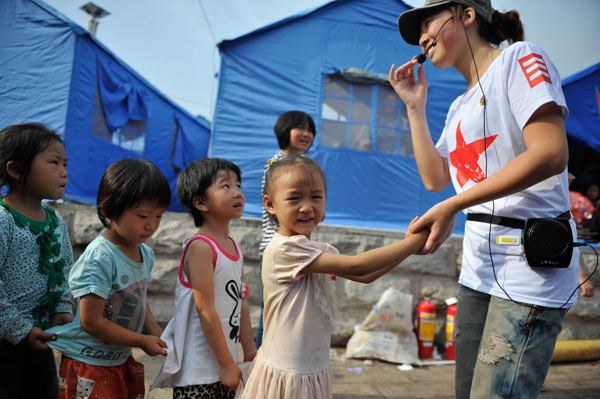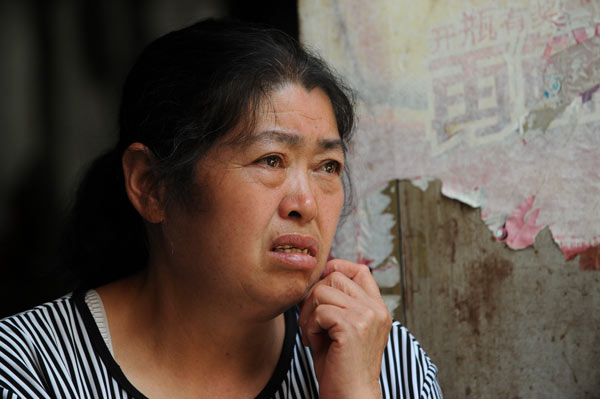Disease prevention next in quake recovery
Updated: 2012-09-11 02:45
By Xu Wei and Guo Anfei in Yiliang, Yunnan (China Daily)
|
||||||||
As power supply returns to villages, residents enjoy freshly-cooked meals
The prevention of endemic diseases has become the most urgent issue in the quake-affected streets and villages in Yiliang county, Yunnan province, as the search for survivors draws close to an end.
 |
|
A teacher plays with children at a makeshift kindergarten in a relocation site for quake victims in Yiliang, Yunnan province.LIU RANYANG / CHINA NEWS SERVICE |
With temperatures reaching 35 C and humidity very high, the risk of endemic diseases, including diarrhea, flu and mosquito-borne viruses, are increasing, warns Zhao Yuanjun, deputy director of the health bureau of Yiliang county.
Cheng Lianyuan, vice-mayor of Zhaotong, told a news conference on Monday that rescuers have searched 95 percent of the earthquake-affected areas and the priority task now lies in disease prevention. However, Cheng promised rescuers would not give up any rescue effort when there is hope of life.
High temperatures are posing difficulties to rescuers involved in endemic prevention efforts. The rescuers have to wear special suits with disinfectant spray on their backs.
"It feels like taking a hot shower in the suit. But we know our job is crucial," said Tian Fusheng, a company commander of a regiment tasked with defending against chemical weapons from Kunming, capital of Yunnan province.
On Monday afternoon Tian and his team helped Huang Rong, a worker at a fish farm in the Luozehe township, to sterilize thousands of dead fish in ponds that were destroyed in the earthquakes.
 |
|
Yan Yongping, a villager who lost her daughter in the quake on Friday, rests at a relocation site in Yiliang county, Yunnan province, on Monday. WEI XIAOHAO / CHINA DAILY |
Tian and his soldiers had to deal with the smell of rotting dead fish, the pungent smell of germicides, and most dangerously, occasional falling rocks from the mountain next to the fish pond.
Despite the risks and difficulties, Chen Yingxiang, a soldier from Tian’s company, said he was lucky to join the rescue effort.
"If I do not come this time, I would probably regret it for the rest of my life," said Chen, who is retiring from military service in December.
"All soldiers crave glory and proof of self-worth. I would be proud if I can play my part in this disaster," he said.
Life at the epicenter
Despite the ongoing recovery efforts there were signs of life on Monday in areas surrounding the epicenter where the earthquake hit the hardest.
At Luozehe township in Yiliang, the electricity supply and cellphone connections have been resumed in the villages and streets that are easily accessible.
On Monday morning an estimated 1,000 local residents at the relocation site at the epicenter of the disaster area were given their first meal other than instant noodles since the earthquake struck. The meal was thanks in part to contributions of vegetables from local residents, many of whom who also volunteered as cooks.
"The government sent in rice and meat and the locals plucked the vegetables from their fields," said Zhao Guizhong, an official from the Luozehe township.
 |
|
Fatigued rescuers nap on the ground in Yiliang, Yunnan province. WEI XIAOHAO / CHINA DAILY |
"We offered them subsidies, but they refused. They say this is not the right time to ask for money," said Zhao.
Chen Junhong in Yiliang contributed to this story.

 Relief reaches isolated village
Relief reaches isolated village
 Rainfall poses new threats to quake-hit region
Rainfall poses new threats to quake-hit region
 Funerals begin for Boston bombing victims
Funerals begin for Boston bombing victims
 Quake takeaway from China's Air Force
Quake takeaway from China's Air Force
 Obama celebrates young inventors at science fair
Obama celebrates young inventors at science fair
 Earth Day marked around the world
Earth Day marked around the world
 Volunteer team helping students find sense of normalcy
Volunteer team helping students find sense of normalcy
 Ethnic groups quick to join rescue efforts
Ethnic groups quick to join rescue efforts
Most Viewed
Editor's Picks

|

|

|

|

|

|
Today's Top News
Health new priority for quake zone
Xi meets US top military officer
Japan's boats driven out of Diaoyu
China mulls online shopping legislation
Bird flu death toll rises to 22
Putin appoints new ambassador to China
Japanese ships blocked from Diaoyu Islands
Inspired by Guan, more Chinese pick up golf
US Weekly

|

|






